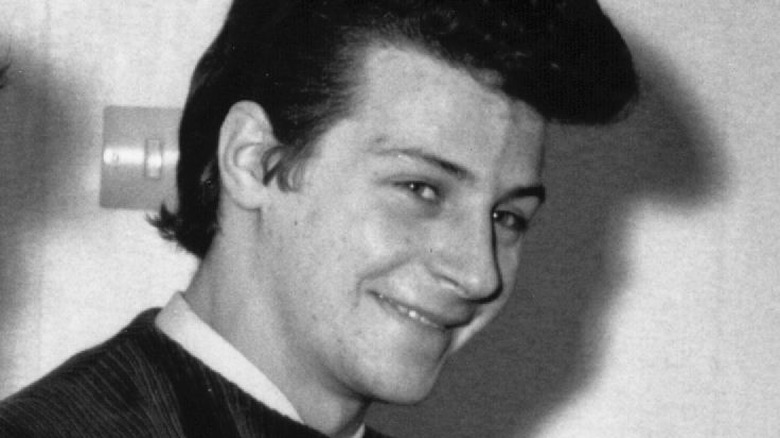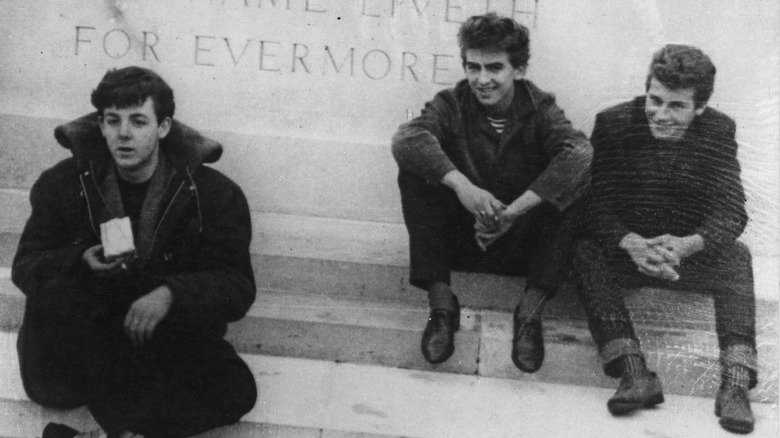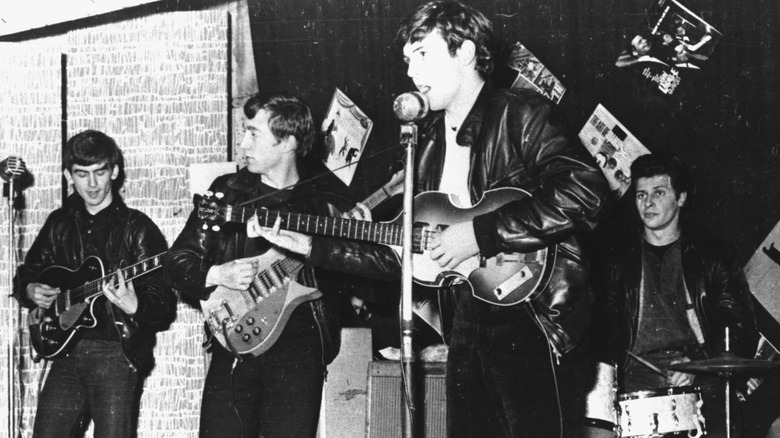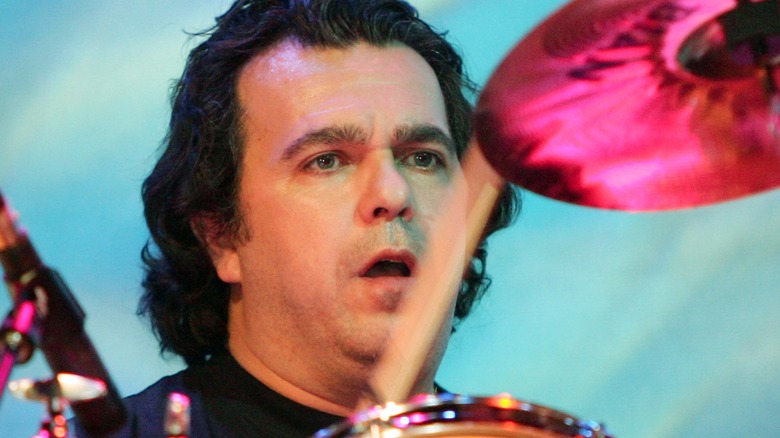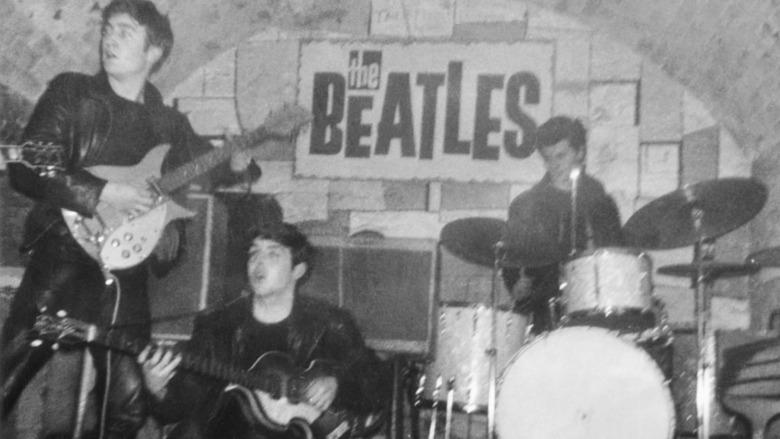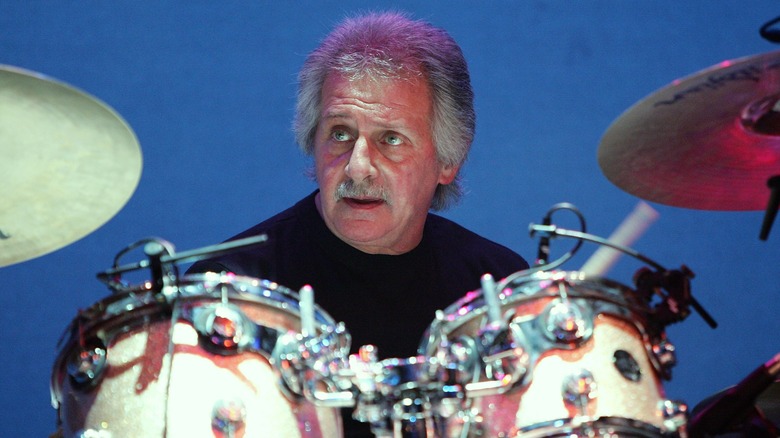Pete Best: The Untold Truth Of The Forgotten Beatle
Many a Beatles fan knows the story by now. Before they truly broke out as chart-toppers in their native England and later on became worldwide superstars thanks to their 1964 appearance on the "Ed Sullivan Show," the Fab Four employed a drummer named Pete Best who wasn't, er ... the best fit for the band. While his replacement, a young man by the name of Ringo Starr, turned out to be the guy the Beatles needed behind the drum kit, Best's name has since become synonymous with someone who leaves or gets fired by their band right before the group becomes famous. Heck, the fine folks at TV Tropes even have a page dedicated to hard-luck stories like Best's, not only in the world of music but also in TV shows, movies, and other forms of entertainment.
On the other hand, there's far more to Best's story than simply being the guy who was replaced by Ringo. Best had a rather interesting stint with the Beatles, and while he never reached the pantheon of rock stardom like his former bandmates, he didn't exactly turn his back on the music business after his fateful firing. Here's the untold truth of the so-called "forgotten Beatle," Pete Best, starting with his earliest days as a member of the not-yet-quite-Fab Four.
Pete Best's stint with the Beatles included jail time and deportation
As noted by Ultimate Classic Rock, Best joined the Beatles on August 12, 1960, five days before they were scheduled to play a series of gigs in Hamburg, Germany. No one else was auditioned for the vacant drummer role. And besides a lack of time for more auditions, John Lennon later explained, Best "could keep one beat going for long enough."
Unfortunately, Hamburg wasn't exactly the most comfortable place for a struggling band of teenagers to establish themselves as musicians. Per the Beatles Bible, the group had to deal with bare-bones accommodations and questionable living conditions at a room in the Bambi Kino cinema. The facility was owned by Bruno Koschmider, who previously booked them to play at his Kaiserkeller club before he terminated their contract.
As the Beatles were set to move to an attic room above another bar, the Top Ten Club, Best and Paul McCartney returned to grab their belongings at the Bambi Kino on the night of November 29, 1960. Unable to see in the darkness, one of the musicians lit up an object but ended up accidentally starting a small fire that extinguished itself quickly and left little damage. Nonetheless, Koschmider was irate, and he accused Best and McCartney of deliberately trying to burn down his cinema. The two young men were arrested and spent the night in jail before they were deported back to England. There, they were reunited with George Harrison, who himself had previously been deported for being underage.
Best did lead vocals on some early Beatles songs
While John Lennon and Paul McCartney shared most of the Beatles' singing and songwriting duties, and George Harrison had enough opportunities to establish himself in both roles, Ringo Starr's participation in the creative process was much more limited, but definitely memorable. It was similar for Pete Best.
Best was given a chance to sing lead vocals during his time with the Beatles — shortly after their return from Germany, the drummer took to the mic on one of the band's newer songs, the Paul McCartney-composed "Pinwheel Twist."
"Paul wrote the song and asked me to do it," Best explained, as quoted by the Beatles Bible. "He coupled it with Joey Dee's hit 'The Peppermint Twist.' I used to get up and do the twist on stage and Paul played my drums. It was a little novelty act and it went down well with the fans."
Best got to do lead vocals on a few more songs, including "Boys," "Matchbox," and "Wild in the Country" — the first two were eventually recorded by the Beatles with Ringo singing lead. However, he was never truly comfortable as a frontman, despite his fan-favorite status among the band's female admirers.
The Beatles' road manager fathered Pete Best's half-brother
Beatles fans may recognize the late Neil Aspinall as the band's longtime road manager, a trusted associate who later headed their multimedia company, Apple Corps. He also had a rather interesting relationship with Best, given how Aspinall eventually fell in love with his friend's mother, Casbah Club owner Mona Best. According to Meet the Beatles for Real, then-19-year-old Aspinall was one of the many boarders who lived in the Best residence in 1960. Mona was 36 years old and "somewhat separated" from her husband, Pete's stepfather, Johnny Best, who was rarely home.
Johnny was unwilling to grant his wife a divorce despite the obvious strain in their marriage. While it's unclear how Aspinall's friendship with Mona blossomed into love, one thing led to another, and on July 21, 1962, Mona gave birth to Vincent Roag Best (pictured above, playing the drums). To avoid the stigma of having an illegitimate child, Mona listed Johnny Best as the child's father.
Pete Best's friendship with Aspinall, however, was primarily tested by the drummer's firing from the Beatles on August 16, 1962. Expecting that he'd stay loyal to the Best family, Beatles manager Brian Epstein was planning to get a new roadie. However, Aspinall continued working for the band while also preserving his friendship with Pete and his romance with Mona, which lasted a total of eight years, per Goldmine Magazine.
The 'rift' that supposedly led to Pete Best's firing
There are many theories that have sought to explain why Pete Best was fired from the Beatles. Were John, Paul, and George jealous of the attention he got from the ladies? Was his once-adequate drumming no longer cutting the mustard for a band that was now clearly on the rise? Regardless of what the real reason was, it was evident that tensions between Best and his bandmates were building up in the months prior to his dismissal.
As reported by Far Out Magazine, Paul McCartney recalled that the rift between the Beatles and Best started during their Hamburg residencies. While McCartney hinted that the band became unhappy with their drummer's skills after watching more experienced bands in Germany, he told the story of a relationship Best had with a stripper that made it hard for him to touch base with the rest of the group. "She didn't finish work until like four in the morning, and he'd stay up until she finished work and then he'd start his evening," McCartney said. "So he'd roll back to us around 10 in the morning or something, and he'd be going to bed when we were getting up. I think that had something to do with a little bit of a rift creeping in."
McCartney also shed light on the issue in his "Wingspan" documentary in 2001 (via People Pill), suggesting that Best, while a good drummer, didn't completely share his bandmates' sense of humor, further establishing him as the odd man out. "Pete had never quite been like the rest of us," McCartney said. "We were the wacky trio and Pete was perhaps a little more sensible; he was slightly different from us, he wasn't quite as artsy as we were."
Pete Best's post-Beatles musical career
After the Beatles, Pete Best remained active in music but as pointed out on his website, he turned down opportunities to join two other promising Liverpool acts: Rory Storm and the Hurricanes (Ringo Starr's former band) and the Merseybeats. He then joined Lee Curtis and the All Stars, serving as the band's "backbone" as they toured the United Kingdom and Germany and finished second to the Beatles in a 1963 popularity poll. After the All Stars' eponymous frontman signed with Decca Records, the rest of the group broke away from him and became the Pete Best Four. Needless to say, they never came anywhere close to the Beatles' success. By 1968, Best retired from music, focusing on family life as he began work as a civil servant.
Best made his musical comeback in 1988, teaming up with half-brother Roag at a Beatles convention in Liverpool and forming the Pete Best Band; the man himself remains active even in his early 80s. And while he was never told why exactly the Beatles chose to move on without him, he explained to The Southern Illinoisan in 2008 that it's all water under the bridge. "I stopped worrying about what the reason for the dismissal was many, many, many years ago," he said. "Simply because the fact is, there's more to life than looking back over your shoulder all the time. I think once you understand that, your priorities change and simple things in life become important."
